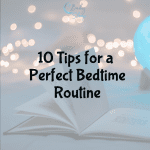
Bedtime is a big deal, parents….as you probably know, bedtime can really set the tone for how the rest of your night will go! A peaceful bedtime routine – one that induces sleep and allows your child to fall asleep without your help – is a great way to encourage sleeping through the night.
The timing of your baby or toddler’s bedtime matters too, of course. We’ve shared recommended baby and toddler bedtimes by age in this cool printable chart, but we still hear often from parents who wonder exactly when it’s best to put their little ones down for bed. Is an early bedtime a good idea? Or is it better to keep your child up later in the evening?
We have answers! Keep reading to learn more about our philosophy of when bedtime should happen in your home.
When Bedtime Is Not Really A “Thing”
Keep in mind that when your baby is a newborn, bedtime isn’t really a “thing”. In the first few months of your baby’s life, sleep will be more cyclical and less clock-based. That is, your baby’s sleep will be oriented around when she last fed, and not around the time of day.
Bedtime For Babies
Once your baby is about 2-3 months old, you can start working towards a more fixed bedtime – somewhere between 8 and 11 p.m. Now, this bedtime probably seems late, but that’s intentional. At this age, you want your baby’s bedtime to time up with yours. Why? Because you’ll want your baby’s longest stretch of sleep at night (ideally the stretch of sleep right after the bedtime feeding) to coincide with your first stretch of nighttime sleep.
Once your baby is about 4 months old, you’ll shift to an earlier bedtime: from 4 – 10 months, you’ll want bedtime to happen between 6 and 7/7:30 p.m. This early bedtime might seem counterintuitive. After all, if you put your baby to bed at 6 or 6:30, won’t he be up at the crack of dawn? Keep in mind, however, that sleep begets sleep. A baby who is in bed relatively early is usually a baby who is rested and not overly tired, and who will sleep soundly and wake at a reasonable hour. A baby who goes to bed late, however, may be overtired at bedtime. If that’s the case, then it’s actually more likely that he’ll wake too early the next morning.
Around 10 months, you may need to start shifting bedtime back a bit, so that it’s happening closer to 7:30. Why? Because by this time, most children are sleeping through the night, which means they’re getting plenty of night sleep, but they are also napping twice per day for 2-3 hours. If your child is taking nice, long naps during the day, you may need to compensate for that with a slightly later bedtime. This will hold true through the 12-month mark.
Bedtime For Toddlers Who Nap
From 12 months until about 15-18 months, your toddler will likely continue taking 2 naps during the day. While your toddler is on a 2-nap schedule, it may be best to stick to a later bedtime of around 7:30 or 8 p.m.
Somewhere between 15-18 months, your toddler will transition from 2 naps to 1 nap. During and immediately after this transition, your toddler will probably need an earlier bedtime as she adjusts to just one nap. Otherwise, you may see a drastic increase in night-waking and a need to do more sleep training. Go ahead and bump bedtime back up to 6:30 or 7 for a while, if it seems necessary. And, on days when your toddler’s afternoon nap is unusually short, you may need to use the earlier bedtime.
However, once your toddler’s one-nap schedule is well-established, you will likely need to shift gradually towards a later bedtime. Between 2 and 3 years of age, if your toddler is still taking a solid afternoon nap, you may need to bump bedtime back as late as 8:30 or even 9, depending on when the nap ends. This is a situation in which a late bedtime is actually advisable! We see many parents who continue to try and put their older toddlers to bed at 7 p.m., only to be majorly frustrated when said toddler won’t fall asleep for 2 hours! But remember, your older toddler needs about 5 hours of awake time between the end of the nap and the start of bedtime. So, be sure to time bedtime accordingly.
Bedtime For Toddlers and Preschoolers Who No Longer Nap
Once your child drops the afternoon nap (usually at some point between 3 and 5 years of age), you’ll want to go back to an earlier bedtime of 6:30 or 7:00. By this point, your child should be sleeping about 12 straight hours at night. So you can time bedtime around when you need your child to wake up in the morning. If you need your child up at raring to go at 6:30 a.m., then a 6:30 bedtime is appropriate.








